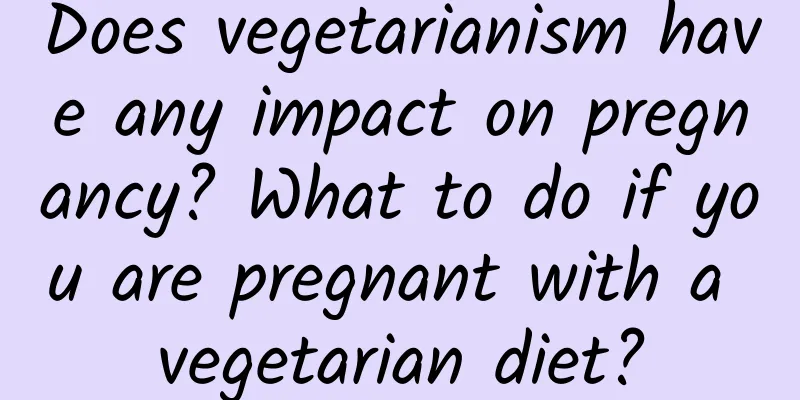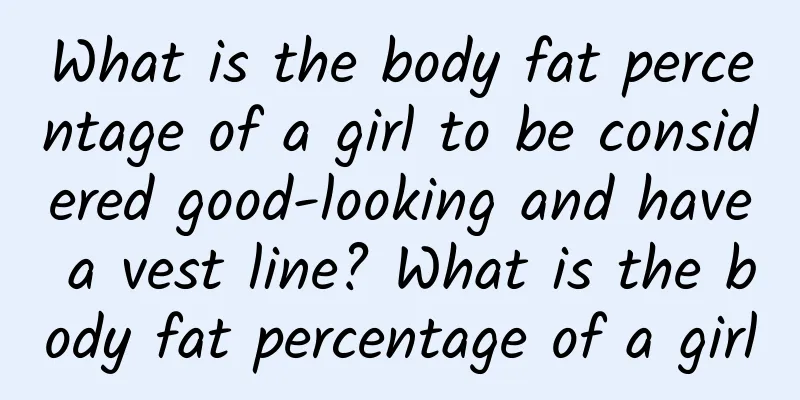Does vegetarianism have any impact on pregnancy? What to do if you are pregnant with a vegetarian diet?

|
Eating a vegetarian diet for a long time may lead to delayed menstruation, lack of nutrition and other phenomena. So what should a vegetarian eat to supplement nutrition after becoming pregnant? Will vegetarianism affect pregnancy? Does vegetarianism affect pregnancy?A large amount of clinical data at home and abroad show that women who are mainly vegetarians will stop ovulating and their menstrual cycles will be relatively shortened. The main reason is that the protein content in the body is too low and the secretion of estrogen is abnormal. This leads to many chronic uterine diseases and affects the normal functioning of the reproductive system. What to do if you are pregnant as a vegetarianprotein Now that you have a baby, you need more protein in your diet. It is not only meat that contains protein. Soy products can provide high-quality protein just like meat, fish and shrimp. If you are a veggie, you can also eat eggs and milk to supplement protein; if you are a vegan, simply consuming beans and other plant proteins is enough. It is necessary to remind you that soybeans, tofu, dried bean curd, yuba... these must be eaten more to supplement protein. However, other "vegetarian meat" and "vegetarian chicken" are refined processed products of soy protein. During the fine processing, a lot of nutrients will be lost. Although they are delicious, you should not be greedy. 2. Calcium Most people think that the only source of calcium is dairy products. That's not true! Broccoli, kale, tofu and nut milks, tahini and almonds are easy to add to your daily diet. You can sauté some broccoli. Toss kale with lemon juice, olive oil, tomatoes and avocado and you have a delicious calcium-rich meal. 3. Supplement iron and DHA Vegetarians (especially vegans) are prone to iron and DHA deficiency, but even if they are not vegetarians, they may suffer from iron and DHA deficiency if their diet is unbalanced. Foods rich in iron include sesame paste, raisins, seaweed, mushrooms, spinach, etc. The α-linolenic acid contained in walnuts, almonds, peanuts, sesame, corn oil, etc. can be converted into DHA in the human body. If the intake is insufficient, you can get it through iron and DHA supplements. Seafood and fungi are gifts from nature to vegetarians, and many long-term vegetarians like to eat this kind of food. Kelp, white fungus, black fungus, shiitake mushrooms, mushrooms, and button mushrooms... In addition to the delicious taste, they especially bring rich protein, vitamins and trace elements to vegetarians. If you can insist on eating a little every day, it will benefit your body a lot. 4. Vitamin B12 Essential vitamin B12 is also known as the "nerve nutrition" vitamin. It only exists in animal foods. If you eat vegetarian food for a long time and do not eat any meat, you may lack vitamin B12. If it is severely deficient, it will cause lack of energy, depression, memory loss, etc. If you are a veggie, if you consume enough milk or dairy products every day, you will basically not lack vitamin B12; if you are a vegan or a veggie who only eats eggs and does not eat milk or dairy products, then you are still prone to vitamin B12 deficiency. There are foods specially designed for vegetarians that are fortified with vitamin B12, as well as supplements containing vitamin B12, which can also be supplemented through supplements. Does vegetarianism during pregnancy affect the baby?If pregnant women eat vegetarian food for a long time, they may suffer from malnutrition. In this way, the fetus cannot absorb all kinds of nutrition, and will not develop well over time, which will have a great impact on bones and other aspects. Therefore, it is important to eat more nutritious foods, fresh vegetables, fruits or some nutritious nuts, etc., which are very helpful for pregnant women and fetuses to supplement nutrition. Pregnant women need to supplement nutrition from all aspects, including various vitamins, proteins, iron, calcium, zinc, etc. They can get more from food, which is safer and more secure. How to supplement nutrition for vegetarians1. Eat more soybeans and soy products Soybeans are the crop with the highest protein content and the most reasonable amino acid composition among plant foods, with an average protein content of 40%. Vegetarians can use soybeans and their products as the main source of high-quality protein. Soybeans also contain unsaturated fatty acids, B vitamins, soy lecithin, soy isoflavones, etc. Fermented soy products also contain vitamin B12. Tofu, tofu shreds, dried tofu and other soy products are processed with calcium-containing coagulants and are a good source of calcium. Since the digestion, absorption and utilization of whole soybeans are not high, eating more soy products, such as tofu, bean skin, etc., can increase the protein digestibility by about 30%, and the taste is better than whole soybeans. It is recommended that vegans consume 50g to 80g of soybeans or an equivalent amount of soy products per day, including 5g to 10g of fermented soy products, and lacto-ovo vegetarians consume 25g to 60g of soybeans or an equivalent amount of soy products per day. 2. Clever combination of cooking oil Vegetarians are prone to lack of n-3 polyunsaturated fatty acids. When choosing cooking oils, they should choose oils rich in n-3 polyunsaturated fatty acids, such as flaxseed oil, rapeseed oil, perilla oil, soybean oil, etc. You can use rapeseed oil or soybean oil for cooking, and use perilla oil or linseed oil when making cold dishes. 3. Mushrooms and seaweed are essential Seaweed has a strong ability to enrich trace elements and is rich in long-chain n-3 polyunsaturated fatty acids. Mushrooms are rich in nutrients and phytochemicals that are beneficial to the human body. Therefore, seaweed and mushrooms can be used as important sources of n-3 polyunsaturated fatty acids, vitamins (especially vitamin B12) and minerals (iron, zinc, etc.) for vegetarians. 4. Sunbathing Appropriate sun exposure can promote the synthesis of vitamin D from 7-dehydrocholesterol under the skin, which is also an important source of vitamin D supplement for vegetarians. 5. Take appropriate nutritional supplements On the basis of the above dietary recommendations, you can supplement with multivitamins, calcium tablets, fish oil, vitamin D, protein powder, etc. It is recommended to consult a nutritionist or consume according to the instructions. |
<<: Does vegetarianism help lose weight? How does vegetarianism help lose weight?
>>: Will vegetarianism cause anemia? How can vegetarians consume protein?
Recommend
How to apply mascara without smudging? Which brand of mascara is recommended?
Mascara is a cosmetic that many girls are familia...
How much does a full-body whitening injection cost? Does a full-body whitening injection need to be injected into multiple areas?
Nowadays, girls are more pursuing fair skin and t...
Can applying olive oil on your face every day help lighten spots, moisturize and remove fine lines?
Olive oil is a kind of cooking oil with good tast...
How to massage slimming cream for better effect? Why should we wrap slimming cream with plastic wrap?
When using slimming cream, you must use the corre...
How much does wrinkle removal surgery cost? How is wrinkle removal surgery performed?
How should wrinkle removal surgery be performed? ...
Artebuf is less expensive. What is the price of Artebuf?
What is Arteve? Arteve is a kind of medical beaut...
How can I burn fat quickly? What are the methods to eliminate fat?
Everyone in life probably wants to be thinner, so...
Is scientific weight loss useful? Scientific weight loss recipes
Nowadays, people are promoting scientific weight ...
What should I do if my eyelids are allergic to eyelash transplantation and become red, swollen and itchy? How many days will it take for the swollen eyelids to heal after eyelash transplantation?
Eyelash extensions can make originally ugly eyela...
What is the function of highlighter and what are the specific steps to use highlighter
Highlighter is a cosmetic that many of us have us...
Can lip mask remove melanin? Can lip mask remove dead skin?
Lip mask is a lip skin care product. There are mo...
How are tongue piercings inserted? How do you find the position for a tongue piercing yourself?
As the piercing culture is accepted by more and m...
Moisturizing cream should be used at night or during the day. How many times a day should I use moisturizing cream?
In autumn and winter, the climate is relatively d...
Should clothes be dried inside out? Here is the correct way
Washing clothes is a common thing in our lives, b...
What is the difference between the sk2 small light bulb and the small silver bottle? Understand the small light bulb and the small silver bottle
sk2 small bulb and small silver bottle are two of...









